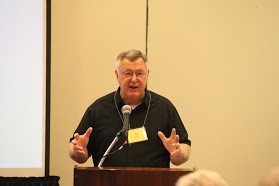Presbyterian Church (U.S.A.) World Mission pre-conference keynote speaker Bob Lupton was living in suburban Atlanta but ministering in the heart of its downtown when he began to feel the tug of a calling.
Just five weeks away from his new suburban home’s completion date, he told his wife he felt the need to move to the inner-city so his ministry could be more effective. So, they did, and it changed the way his ministry operated.
He noticed that clothing from the clothes closet ended up strewn aside on the streets if it didn’t fit. Food pantry recipients felt a sense of entitlement to the hand-outs. Fathers of families who were receiving gifts for Christmas from suburban churches would disappear in shame when the gifts were delivered.
And the well his church provided in a third world country? It broke down every year, and wouldn’t get fixed until the next mission trip arrived.
While those giving felt great, those receiving did not. Ultimately, none of those ministries helped.
That is, not until Lupton began asking the right questions and transforming those ministries into partnerships that enabled those on the receiving end to be participants in a transaction rather than recipients of a gift.
Lupton authored a book called “Toxic Charity” that is the basis for presentations he gives on a regular basis around the country, challenging those who want to give back to partner with those they see as poor, rather than one-way giving.
Lupton’s shared his thoughts at the Kentucky International Convention Center here to a bumper crowd of 150 registered participants. The pre-conference is held prior to Big Tent, an Aug. 1-3 celebration of PC(USA) mission and ministry organized around the theme “Putting God’s First Things First.” It’s composed of 10 national Presbyterian conferences, more than 160 workshops and special events to mark the 30th anniversary of the formation of the PC(USA) and the 25th anniversary of the opening of the Presbyterian Center here.
Lupton will speak again at the World Mission partner conference at Big Tent.
Rather than operating as a charitable give-away, Lupton said, his ministry’s Christmas gifts were instead set up as a small shop with discounted new items for families to purchase for their children.
The clothes closet became a thrift store, and the recipients became customers.
The village built its own well, discovered it had excess capacity, and sold the extra water to a neighboring school.
The food pantry transformed into a food co-op, with collective buying power, and now operates a successful restaurant near the Atlanta Braves stadium.
Rather than viewing people as victims, they should be viewed as neighbors who have something to contribute, Lupton said. “Why on earth do we want to exclude the poor from the process of exchange? It says you have nothing of worth that I desire in return.”
Hunter Farrell, director of World Mission, introduced Lupton by saying that many congregations are seeking ways to delve deeper in mission, and that Lupton’s process of thoughtful questioning will help them do so.
“Presbyterians around the world want to go deeper with our global partners,” Farrell said. “We want to ask deeper questions. We want to listen to our partners, we want to work with them as part of the body of Christ. Bob Lupton’s brought people together in some beautiful ways, helping them to bridge gaps and see a common goal and work together for a common goal.”

